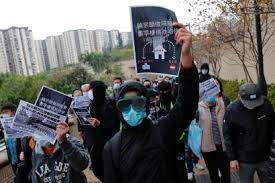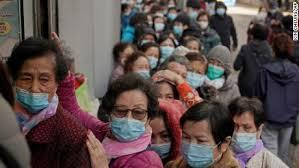“Ever heard of the movie Ground Hog Day? Well that pretty much sums up how we feel.”
Those are the words of my good friend, Jenna, living in Xi’an, North West China with her husband and two girls, nine and thirteen.
Lockdown in China no school
" alt="" data-large-file="https://i0.wp.com/mintmochamusings.com/wp-content/uploads/2020/02/Coronavirus10.jpg?fit=1024%2C768" data-image-title="Coronavirus in Xian" width="1440" data-comments-opened="1" data-permalink="http://mintmochamusings.com/ground-hog-day-this-is-what-life-in-chinas-coronavirus-lockdown-is-really-like/coronavirus10/" data-image-meta="{"aperture":"0","credit":"","camera":"","caption":"","created_timestamp":"1580760188","copyright":"","focal_length":"0","iso":"0","shutter_speed":"0","title":"","orientation":"0"}" data-attachment-id="9689" data-jpibfi-post-title="Ground Hog Day: This is what life in China’s Coronavirus lockdown is really like." data-medium-file="https://i0.wp.com/mintmochamusings.com/wp-content/uploads/2020/02/Coronavirus10.jpg?fit=300%2C225" data-jpibfi-post-excerpt="" data-recalc-dims="1" class="aligncenter size-full wp-image-9689" src="https://i0.wp.com/mintmochamusings.com/wp-content/uploads/2020/02/Coronavirus10.jpg?resize=1440%2C1080" data-jpibfi-post-url="http://mintmochamusings.com/ground-hog-day-this-is-what-life-in-chinas-coronavirus-lockdown-is-really-like/" sizes="(max-width: 1000px) 100vw, 1000px" srcset="https://i0.wp.com/mintmochamusings.com/wp-content/uploads/2020/02/Coronavirus10.jpg?w=1440 1440w, https://i0.wp.com/mintmochamusings.com/wp-content/uploads/2020/02/Coronavirus10.jpg?resize=300%2C225 300w, https://i0.wp.com/mintmochamusings.com/wp-content/uploads/2020/02/Coronavirus10.jpg?resize=1024%2C768 1024w, https://i0.wp.com/mintmochamusings.com/wp-content/uploads/2020/02/Coronavirus10.jpg?resize=640%2C480 640w" />“With school closed until at least the 18th of February, it’s get up, breakfast, exercise, play with toys, boardgames, cook, repeat,” she says.
Xi’an is in Shaanxi Province which shares a border to the south with Hubei Province, and its capital Wuhan, the epicentre of the Coronavirus outbreak.
Currently over 20,000 people worldwide have developed the virus with over 400 confirmed deaths. While that figure is steadily rising, and has now overtaken the death toll from SARS, it’s still only a two per cent fatality rate.
But China’s Communist Party is taking no chances. At least not at face value.
The outbreak has prompted a response unlike any other in modern history, with Chinese authorities locking down many cities and towns around Wuhan, the city of 11 million where it’s believed the virus originated in a market selling wild animals.
That’s tens of millions of people effectively shut off from the outside world.
Anyone who’s ever been to China will tell you, there’s rarely a quiet moment in the nation with the world’s largest population. The streets are at best, chaotic – humming with people, cars, busses, motorbikes, food carts, and street cleaners, day and night — all fighting for their space amongst the pandemonium. The noise can be almost deafening.
But not this month.
“It feels very eery, like a ghost town, everything is closed down. The only places that are required to stay open are the supermarkets and hospitals. At our complex one gate is completely sealed off, with one left open for us to get out and go shopping. No one from outside the building is allowed in. No family, no friends.”
“The days are still and far too silent for this city of 9 million people.” says Jenna, who having lived in China for 13 years, has seen it all.
Her main concern though is the millions who sell fruit and veggies at the local wet markets or run local restaurants. “How are they going to get an income?” she wonders. “At least the big companies are looked after by the government.”
An Australian friend Robyn, who’s been in China for nine years, and was due to return home to Australia any day now (flights depending) is feeling bereft that there will be no goodbyes in person, no last hot pot meals, just a quiet exit. “We are now very isolated in this crowded city,” she says.
She has a friend who lives in the south east of Henan, very close to the border of Hubei Province, just three hours drive from Wuhan. She tells her, all roads into my village are barricaded.
“So instead of the normal flocks of people returning to celebrate Spring Festival, my village is very quiet. Everyone is bored and strangely no groups of people are milling around talking and no children are playing.”
Temperature taking is the new norm across the Middle Kingdom. Officials in full Hazmat-style body suits are taking temperatures at random, catching people when they go out, and when they return home, and everything is being recorded.
Police and security guards are knocking on people’s doors to check if anyone in the household’s feeling unwell, is harbouring any visitors or has travelled anywhere in the past week.
And in a nation that survives on Taobao deliveries with thousands of little Tuk Tuks weaving in and out of laneways delivering packages to one and all 24/7, now, all deliveries are left at the gates, making contact minimal.
Messages come through on We Chat, the What’s App equivalent, informing people there will be ‘centralised spraying of medicinal drugs by aircraft.” What drugs nobody is really sure.
The communal areas in Jenna’s apartment are regularly sprayed down with vinegar, while a friend’s complex is doused in bleach.
Public transport is down to a bare minimum. Didi the Uber equivalent has stopped and taxis are few and far between. If you do manage to hale a taxi and they stop, you need to show your passport; all details are recorded including where they picked you up and dropped you off.
In Wuhan, naturally, things have reached another level with almost everything closed. Bibby, a Chinese local says, people are told not to go out unless it’s an absolute emergency. “Supermarkets are open for a limited time from 10am to 6pm with meat and veggies the most difficult to buy, and always the first thing to run out.”
Face masks, which have usually only been an accessory for foreigners protecting themselves against the heavy pollution are now mandatory, or face a hefty fine.
Hotel General Manager, Peter, in Shenzhen, China’s far southwest, had just come through the border crossing from Hong Kong after evacuating his teenage daughter, when he messaged me. “It’s unheard of but almost no-one is at immigration and everyone going through has to fill in a health declaration.”
He has 400 hotel staff due back from various provinces around China after Chinese New Year and is renting rooms to quarantine them.
Meantime, in Hong Kong, thousands of medical workers have gone on strike, demanding the city’s government shut down all of its borders with mainland China, to keep out the spread of the virus they call WARS.

Many foreigners have chosen to leave the city which is already reeling from months of pro-democracy protests, not to mention the 2003 SARS epidemic which still weighs heavily on the city. Hong Kong local, Mona, says back then, they all worked together to fight the disease but 2020 is very different. “We urged the government to close the borders as quickly as possible but they are not listening.”
“Because of no planning the supply of masks is extremely tight and people are queuing up for four to five hours to buy just one box of masks, with some stores selling them for HKD900 (US$115).

Hong Kong infectious disease experts are urging the government to take ‘draconian’ measures, estimating as many as 44,000 people could be infected in Wuhan, a figure far higher than official numbers.
Amongst the uncertainty, it’s believed the epidemic could peak around the end of April, early May.
This article from Well Women explains why, despite the risk, so many expats are still choosing to stay in China.
For them, ground hog day or not, it’s still home and in many instances, probably safer than travelling.

